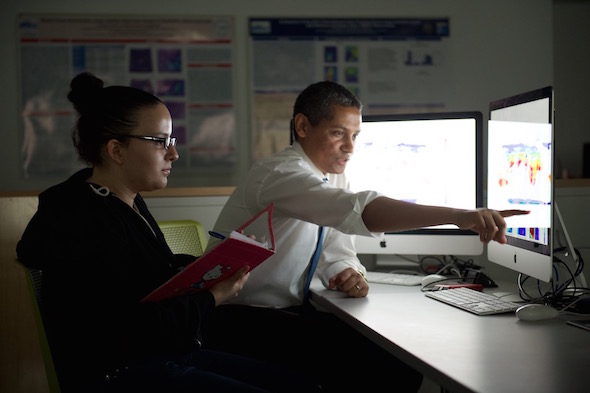
“I met Crystal when she was in my physics class,” says Professor Kibrewossen Tesfagiorgis. “She asked all kinds of questions, and that’s the kind of person you want in your research project,” which in his case, centers on the world’s fresh water resources, and was inspired by his childhood in Ethiopia, where “I saw people walking miles to carry water back to their home,” he says.
Tesfagiorgis earned a Ph.D. in Civil Engineering at the Graduate Center, CUNY, focusing on remote sensing and hydrology, then worked as a postdoctoral scientist at NOAA-CREST, the National Oceanic and Atmospheric Administration-Cooperative Remote Sensing Science and Technology Center at City College, CUNY.
There, he joined a project developing a Global Flood Monitoring System, using microwave satellite data to estimate the soil wetness variational index (SWVI).
Once Professor Tesfagiorgis became Crystal Mena’s mentor in the National Science Foundation (NSF) program LSAMP (Louis Stokes Alliance for Minority Participation), she was keen to join the flood project and analyze a 2013 flood in Uttarakhand, India that had caused over 6,000 fatalities. First though, says Tesfagiogis, she needed training in computer coding, so Tesfagiorgis arranged for her to take a MATLAB workshop with NOAA-CREST at City College.
The programming language MATLAB enables scientists to work with large amounts of data, and Mena is using it to compare data sets with those from the Dartmouth Flood Observatory, SWVI and TRMM (NASA’s Tropical Rainfall Measuring Mission); looking to see how flooding and rainfall are correlated.
“We’re translating satellite data into a graphic representation, the SWVI,” she says. “We’re asking, ‘Why does it take so long for flooding to occur after rainfall?’ We take the snow on the ground, rain clouds and other variables into account.”
In February 2015, Mena presented a poster on the research at the Emerging Researchers National Conference in STEM (Science, Technology, Engineering and Math), in Washington, D.C. A member of Phi Theta Kappa and on the Dean’s List, Mena grew up in East New York, Brooklyn, the youngest of four siblings and the only one to graduate high school and go to college. “They give me pep talks about the flood research,” she says, “and always have my back.”

